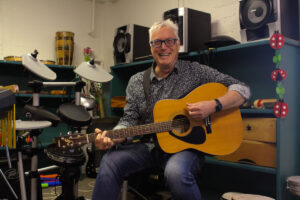Tāmaki group makes access to eco-friendly sanitary items more affordable
A Tāmaki group says reusable sanitary products cost a fraction of the estimated $3931 women spend on disposable pads or tampons during their lifetime.

Victoria Egli wants all women to have access to sanitary items but thinks there is a better solution than subsidising the cost of disposable items.
Egli is one of the founding members of United Sustainable Sisters (USS), a Tāmaki community group promoting the use of reusable sanitary cups and pads.
Reusable products cost a fraction of the estimated $3931 women spend on disposable pads or tampons during their lifetime.
They also reduce the estimated 9360 disposable sanitary items sent to landfills over a woman’s lifetime; this waste can take up to 500 years to biodegrade.
The initiative grew out of a conversation held in a community garden.
“We wanted to address some of what we were seeing in our community, the need people have for these products and the difficulty accessing them,” said Egli.
Egli had heard stories around women who couldn’t afford sanitary items using scrunched up toilet paper like a tampon.
“That is a real health problem because of the risk of toxic shock syndrome, particularly if some gets dislodged and remains in the body.”
The group felt there was a lack of access to these products in Auckland and the price was prohibitive for many women.
Six months since their proposal received an Auckland Council waste minimisation grant, Egli said the need for the reusable products is greater than imagined.
Their self-set target of sales or donations of cups has been met in half the time they expected and there is a waiting list of people wanting the reusable pads.
The pads are currently being sewn by community groups, as part of USS’s social enterprise approach. Volunteers sewing the pads are being taught sewing to upskill themselves and improve employment opportunities.
Egli said an important part of the initiative is ongoing support.
“We don’t just give you a cup to walk away with. Having a safe, supportive environment to ask questions, means people try it, they continue to use it and they tell their friends.”
Each cup the USS sells or donates comes with simple instructions and the phone number of a USS member to contact if you have questions.
There is also a closed Facebook group where people can post questions to get help and advice.
To distribute the cups USS runs workshops with community groups such as Lifewise, New Zealand Prostitutes Collective, and City Mission, and ensure they also include follow-up visits to answer questions around use.
“Obviously for women who have difficulty in their living circumstances pads and tampons are really difficult, but one cup, and you’re sorted.”
The cups are free for those in need, or can be purchased for a donation. A $20 donation purchases one cup and pays for another cup to be donated.
The freedom from repeat purchasing is one of the reasons Egli loves reusable products.
“It’s not just the environmental sustainability, it’s the financial sustainability as well. Where disposable products require input regularly, every month, whether it’s subsidised by the government or had the tax taken off it you still need to buy them – every month. A reusable product sets you up for a number of years.
“I think they’re really awesome.”
One of the long term hopes for the group is for reusable products to be part of the education system.
“So when you have those girls’ days at school where they teach you about stuff, reusable options are part of the standard norm.”
Menstrual Cups
- Are worn inside the body
- Can remain in place for eight to 12 hours before needing to be emptied
- Can be washed with fresh water before and after each use
- Are made from medical grade silicone or latex
- Have a life span of seven to 10 years
- Can be used by women of all ages
- Will not damage the hymen
- 98 percent of women with IUDs use them without issue
Reusable Pads
- Are worn outside the body
- Can remain in place for the same amount of time as disposable pads
- Are made of fabric and a waterproof lining
- Can be washed in the washing machine between use
- Last for a number of years before needing to be replaced
United Sustainable Sisters can be contacted through the Tāmaki WRAP website or their public Facebook page.




